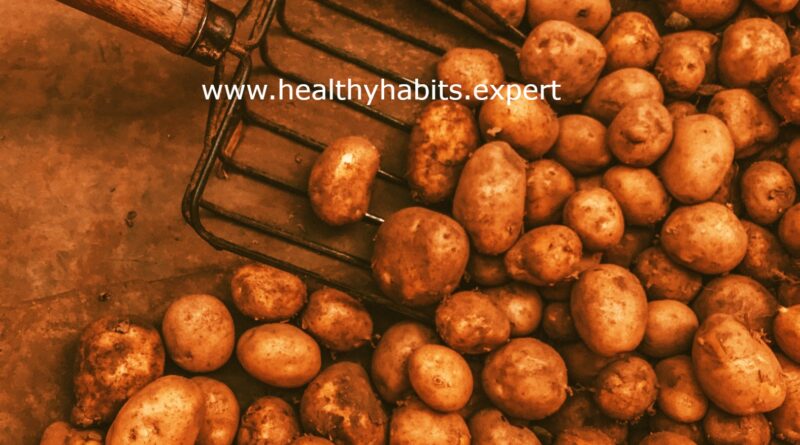Calories in Potatoes
When it comes to maintaining a solid way of life, it is critical to figure out the idea of calories. Calories are a unit of energy, and they assume a critical part in deciding the healthy benefit of the food we eat. By realizing the calorie content of various food sources, we can settle on informed decisions and deal with our general energy consumption.In this article, we’ll investigate the topic of calories in potatoes, their nutritional composition,and how to integrate them into a balanced, healthy diet.
What are calories?
Calories are a proportion of the energy given by food when eaten and processed by our bodies. They are fundamental for fueling our bodily functions, including physical activity, organ function, and maintaining overall health. Every individual has a remarkable day-to-day calorie necessity, which relies upon elements like age, gender, weight,height, and activity level.
The importance of understanding calorie intake
Monitoring your calorie admission is fundamental for keeping a solid weight and generally speaking prosperity. Consuming a larger number of calories than your body needs can prompt weight gain while consuming fewer calories can bring about weight reduction. It’s critical to work out some kind of harmony between energy admission and consumption to accomplish and keep a sound weight.
Nutritional composition of potatoes
Before plunging into the calorie content of potatoes, how about we investigate their, generally speaking, nourishing piece? Potatoes are a decent wellspring of a few fundamental supplements, including carbohydrates, vitamins, minerals, and dietary fiber.
Macronutrients in Potatoes
Potatoes are primarily composed of carbohydrates, which are the primary wellspring of energy for our bodies. They likewise contain a limited quantity of protein and essentially no fat. The sort of sugars found in potatoes is complex carbohydrates, which are digested more slowly and give a consistent arrival of energy.
Micronutrients in potatoes
Potatoes are wealthy in different micronutrients that are significant for our well-being. They contain huge measures vitamin C, vitamin B6, potassium, and magnesium. Furthermore, they give more smaller amounts of different vitamins and minerals, like iron and phosphorus.
How many calories are in potatoes?
The number of calories in potatoes can change contingent on different variables, including their size, cooking strategy. All things considered, a medium-sized potato (around 150 grams) contains roughly 110-120 calories. Nonetheless, it’s critical to take note that this calorie content can vary slightly.
Factors influencing calorie content in potatoes
A few variables can impact the calorie content of potatoes. We should investigate two key elements: cooking methods and potato varieties.
Cooking methods and calorie retention
How potatoes are Cooked can influence their calorie content. For example, baking or boiling potatoes with negligible added fats or oils will bring about a lower calorie content contrasted with frying them. fried potatoes, for example, French fries or potato chips, tend to have a higher calorie content because of the additional fats.
Potato varieties and calorie differences
Different varieties of potatoes may have slight differences in their calorie content. Nonetheless, these distinctions are for the most part negligible and shouldn’t fundamentally influence your general calorie consumption.
Health benefits of potatoes
Notwithstanding being related to starches and calories, potatoes offer a few medical advantages when consumed as a component of a decent eating routine. Here is a portion of the benefits they give:
Dietary fiber and satiety
Potatoes are a decent wellspring of dietary fiber, which helps with digestion . Eating fiber-rich food varieties can assist with controlling appetite, overseeing weight, and support digestive well-being.
Vitamins and minerals in potatoes
Potatoes are plentiful in fundamental vitamins and minerals that are significant for general well-being. Vitamin C goes about as an antioxidant, supporting the immune system and advancing skin health. Vitamin B6 is associated with energy digestion and brain health. Potassium and magnesium add to heart well-being and legitimate muscle capability.
Antioxidants in potatoes
Potatoes contain different cell antioxidants, including phytochemicals like carotenoids and flavonoids. These combinations assist with shielding our cells from harm brought about by ffree radicals and may have likely anti-inflammatory properties.
Managing calorie intake with potato-based recipes
Potatoes can be prepared in various tasty and sound ways. Consider the accompanying procedures and recipes to oversee calorie consumption while enjoying in the goodness of potatoes:
Healthy potato cooking techniques
Rather than deep-frying potatoes, have a go at baking, boiling, or roasting them with minimal added fats. These techniques hold the normal flavors and textures while decreasing calorie.
Low-calorie potato recipes
Investigate creative and solid recipes that integrate potatoes as a principal or side ingredient. A few choices incorporate cooked potato wedges, pureed potatoes made with diminished-fat milk, or barbecued potato and vegetable skewers.
Understanding the calorie content of potatoes is important for making informed dietary decisions. Although potatoes contain calories, they also provide fundamental complements and can be essential to a sound, tailored diet. By keeping an eye on segment size and choosing sound cooking strategies, you can enjoy the benefits of potatoes while maintaining a healthy lifestyle.

